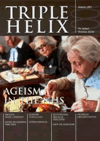It's all too easy to write off asylum seekers as scroungers or economic opportunists. Among the asylum seekers who find themselves in Britain are highly qualified professionals, many of whom possess experience and skills that could be put to good use. Included among them are a surprisingly large number of doctors.
The exact numbers are not known but the Student BMJ reports that estimates range from 500 to 2,000. These are people who suffer a form of bereavement - loss of country, loss of family and friends and loss of status that goes with being a respected professional. They also have to contend with living on or below the poverty line in a country and culture that is unfamiliar.
What is certain, however, is that most refugee doctors want to make a contribution to their host community. Most have a strong sense that they would like to put something back into the community that has offered them a home. Few want to live off social services handouts or allow their professional skills to lapse. The NHS suffers an acute shortage of doctors, to a point where recruiting from abroad is on the agenda. It makes lots of sense to ensure that the resource of refugee doctors is tapped as much as possible.
All this sounds straightforward, but there are obstacles. Genuine refugees often did not have the time to collect references or all the needed documents to prove their status and qualifications. It is possible for refugee doctors to undertake clinical attachments in order to acclimatise to the British system and hone and update their skills, but not all refugee doctors can afford the fees involved. To register with the General Medical Council they need to pass English-language examinations. Where there are serious financial pressures these can prove very difficult.
It is therefore encouraging that the government has taken up the issue of refugee doctors in two important documents that report on the scope of the issue and suggest strategies for the integration of refugees. This is not a problem that can be solved overnight and a lot depends on the willingness of members of the profession to get involved in practical ways. There are opportunities here for Christian doctors. One way might be to offer to mentor a refugee doctor, the first step being to join the BMA register of volunteers.
































